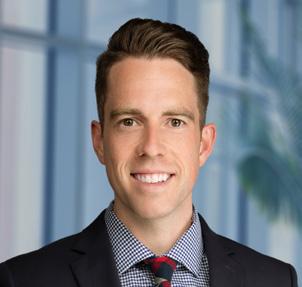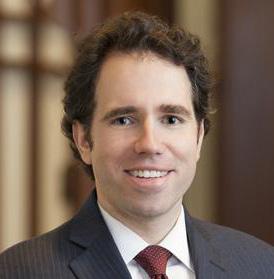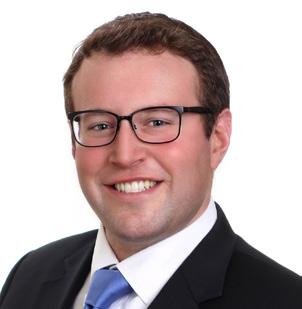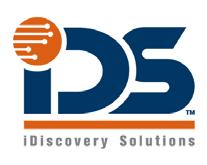
ISSUU.COM/TODAYSGC $199 SUBSCRIPTION RATE PER YEAR ISSN: 2326-5000 OCTOBER 2022 VOLUME 19/NUMBER 7 TODAYSGENERALCOUNSEL.COM Maximizing Payout From Your Insurers Cutting Legal Department Spend Civil Cyber-Fraud Initiative The Many Ways E-mails Can Compromise Privilege SEC Focus ON ESG Data-Mining Contracts To Minimize Risk










adr.org | +1.800.778.7879 ©2022 American Arbitration Association, Inc. All rights reserved. EXPERTISE Matters.
4 Editor’s Desk
COMPLIANCE
10 Trends In False Claims
Enforcement
Health care industry in the crosshairs.
By David I. Kelch and Carla L. Brack
COLUMN/PRIVILEGE PLACE
12 A Whisper Doesn’t Cut It
And maybe a long email string is a bad idea.
By Todd Presnell
FEATURES
8 Nebula Partner Spotlight: Trinity Legal Discovery
A partner program designed to help legal industry professional services organizations better serve their clients.
14 Can Contract Lifecycle Management Help RecessionProof Your Business?
Leveraging data to optimize process.
 By Dave Parks
By Dave Parks
16 Six Ways To Cut Legal Department Spend That Won’t Cost Your Team
Consolidate counsel, track spending, consider AI-driven technologies.
By Kristin Zmrhal
18 ESG Enforcement and Litigation Risks
Class actions and SEC enforcement may piggyback.
By Petrina Hall McDaniel, Adwoa GharteyTagoe Seymour, and Sean McGrane
20 CC: Legal
Sometimes it’s better to use the phone.
By David A. Michel and Stella T. Oyalabu
22 Tips To Maximize Insurance Recovery
Read your policies, don’t miss deadlines, submit all costs.
By Mikaela Whitman
3OCTOBER 2022 TODAYSGENERALCOUNSEL.COM contents OCTOBER 2022 Volume 19/Number 7
8
At the tail end of the last century, in-house legal departments were beginning to look expendable. A few big departments, like the one at Chicago’s Continental Bank, disappeared. Their entire legal function was outsourced. A consensus soon formed that in-house attorneys needed to spend less time looking for potential problems with business deals and more time integrating themselves into business strategy. Overall that has been a success, but now a question which rarely arose in the bad old days when lawyers were “deal killers” is always on the table: Are inter-corporate communications involving attorneys privileged? In this issue of Today’s General Counsel, columnist Todd Presnell writes about staying on the safe side given that courts are applying widely different standards for attorney/client privilege, and David Michel and Stella Oyalabu discuss a case in Louisiana in which failing to label an opinion as “legal advice” blew the privilege for an entire email string. Kristin Zmrhal recommends ways to cut legal department spending without compromising effectiveness. Her suggestions include staying ahead of litigation risk by engaging with other departments, automating manual processes and tracking spend against key metrics. In other articles, Dave Parks writes about the ways contract analysis can be another cost-saver, Mikaela Whitman provides some tips on how to maximize insurance recovery, and David Kelch and Cara Brack discuss trends in False Claims Act enforcement. They note that cybersecurity and Covid relief payments are two areas receiving heightened scrutiny from the DOJ.
 Bob Nienhouse, Editor-In-Chief
Bob Nienhouse, Editor-In-Chief

4 TODAYSGENERALCOUNSEL.COM OCTOBER 2022 BACK TO CONTENTS EDITOR’S DESK
bnienhouse@TodaysGC.com
ACCESS GRANTED


Join NACD today to unlock your full board’s potential. Save 15% on Corporate Membership from Oct. 17 - Nov. 17.
Visit nacdonline.org/membership to join today.
EXECUTIVE EDITOR
Bruce Rubenstein
EDITOR-IN-CHIEF
Robert Nienhouse
CONSULTING EDITOR
David Rubenstein
CHIEF OPERATING OFFICER
Stephen Lincoln
DIGITAL EDITOR
Catherine Lindsey Nienhouse
SENIOR EDITOR Barbara Camm FEATURES EDITOR Jim Gill
MANAGING DIRECTOR OF CLIENT PARTNERSHIPS & INITIATIVES
Lainie Geary
DATABASE MANAGER Patricia McGuinness
ART DIRECTION & PHOTO ILLUSTRATION
MPower Ideation, LLC
CONTRIBUTING EDITORS AND WRITERS
Cara L. Brack
Adwoa Ghartey-Tagoe Seymour
David I. Kelch
Rachel Kreitz
Petrina Hall McDaniel Sean McGrane
David A. Michel
Stella T. Oyalabu
Dave Parks Todd Presnell
Mikaela Whitman
Kristin Zmrhal
SUBSCRIPTION
For
Dennis Block
GREENBERG TRAURIG, LLP


Thomas Brunner WILEY REIN
Peter Bulmer JACKSON LEWIS
Mark A. Carter DINSMORE & SHOHL
James Christie BLAKE CASSELS & GRAYDON
Adam Cohen FTI CONSULTING
Jeffery Cross FREEBORN & PETERS
Thomas Frederick WINSTON & STRAWN
Jamie Gorelick WILMERHALE
EDITORIAL ADVISORY BOARD
Robert Haig KELLEY DRYE & WARREN
Robert Heim DECHERT
Joel Henning JOEL HENNING & ASSOCIATES
Sheila Hollis
DUANE MORRIS
David Katz
WACHTELL, LIPTON, ROSEN & KATZ
Steven Kittrell MCGUIREWOODS
Nikiforos latrou WEIRFOULDS
Timothy Malloy MCANDREWS, HELD & MALLOY
Steven Molo MOLOLAMKEN
REPRINTS
Thurston Moore
HUNTON & WILLIAMS
Robert Profusek
JONES DAY
Art Rosenbloom
CHARLES RIVER ASSOCIATES
George Ruttinger
CROWELL & MORING
Jonathan S. Sack
MORVILLO, ABRAMOWITZ, GRAND, IASON & ANELLO, P.C.
Victor Schwartz
SHOOK, HARDY & BACON
Jonathan Schiller
BOIES, SCHILLER & FLEXNER
Robert Zahler
PILLSBURY WINTHROP SHAW PITTMAN
For reprint requests, email Lisa Paynelpayne@mossbergco.com
Mossberg & Company Inc.
All
Today’s
N.
Image source:
not
Chicago, Illinois 60606.
Subscription rate per year: $199
subscription requests, email subscriptions@todaysgc.com
rights reserved. No part of this publication may be reproduced or transmitted in any form or by any means, electronic or mechanical, including photocopy, recording, or any information or retrieval system, without the written permission of the publisher. Articles published in Today’s General Counsel are
to be construed as legal or professional advice, nor unless otherwise stated are they necessarily the views of a writer’s firm or its clients.
General Counsel (ISSN 2326-5000) is published ten times per year by Nienhouse Group Inc., 110
Wacker Drive, Suite 2500,
iStockphoto | Copyright © 2022 Nienhouse Group Inc. Email submissions to editor@todaysgc.com or go to our website www.todaysgeneralcounsel.com for more information.



Learn How DISCO Can Elevate Your Legal Practice at csdisco.com/raise-the-bar Technology You’ll Love. Better Legal Outcomes.
Nebula Partner Spotlight: Trinity Legal Discovery
KLDiscovery’s Nebula Partner Program helped Trinity Legal Discovery grow and achieve their business goals. Learn how in their partner spotlight interview with Rachel Kreitz, CEO of Trinity Legal Discovery.

How did you get into the litigation support and eDiscovery industry specifically?
Prior managers from my automotive past had experience in the litigation support industry. They knew my work ethic and that I was willing to learn a new industry, which turned out to be the world of litigation support. Over time, I saw technology changing the way this industry operates and knew digitization and automation would revolutionize the way we do eDiscovery and litigation support.
When did you make the transition to business ownership? What influenced you to make the move?
My husband, Bryan, and I discussed becoming entrepreneurs as it was some thing he was eager to do. We founded Trinity Legal Discovery in August of 2015 to fulfill a growing need for personalized support and a higher level of customer service in the legal solutions market. Combined, Bryan and I have more than 35 years of experience in this industry, and we set out to change the way eDis covery projects were handled by putting our clients’ needs ahead of ours.
Because Trinity Legal Discovery is a family business, would you share insights learned while working and partnering with your spouse?
KLDiscovery’s Nebula Partner Program is designed to help professional services organizations in the legal industry grow by providing advanced technology with a proven track record of success, unparalleled flexibility in deployment models, and the ability to service clients at any scale. In the partner spotlight interview below, we highlight Rachel Kreitz, CEO of Trinity Legal Discovery in Houston, Texas along with her husband and business partner Bryan Kreitz, President of Business Development. As a successful business owner and partner in our Nebula Partner Program, Rachel is enthusiastic about sharing her experience both as an entrepreneur and with Nebula
to assist other legal organizations with their paths to growth and expansion.
Would you tell us about yourself and your previous work experience?
I am a native of Houston. Growing up, my mother and sister influenced me and instilled a love of learning, which is still with me today. In terms of my career, I started in the automotive industry working my way from receptionist to regional business manager in three years. After leaving that industry I started my career with The MedLeh Group working on the business operation side of things, including learning litigation support, accounting, and operations.
We work well together and have decades of experience in this business. Bryan likes to stretch and reach for new goals, and I balance that out with under standing the practicality of the business. We align on the focus for the business and then make sure we find time to sep arate work from our home and personal lives.
What are some of the pivotal moments you have experienced in terms of business ownership?
In April of 2019, I became certified by the WBENC as a woman-owned business. Later that year, I registered with Goldman Sachs 10,000 Small Businesses Program, which gave me amazing insight on running our com pany and the best practices to use going
8 TODAYSGENERALCOUNSEL.COM OCTOBER 2022 BACK TO CONTENTS SPONSORED
forward. These were huge moments in the way I operated the business and in making important contacts.
What insights and expertise can you share on growing a successful business in a highly competitive industry?
Customer care is the biggest strength we have. Our team is strong at helping set expectations and communicating with customers, tailoring our services to meet their unique and evolving needs. We are also experienced in hiring experts in particular fields for last-minute proj ects. Having this specialty is critical.
With your seasoned perspective on the industry, would you tell us more about the changes you have implemented at Trinity Legal Discovery since the company’s founding?
Part of my leadership role includes helping team members and even clients overcome old ways of doing business, in favor of newer, more efficient ways. I do that by asking questions on how we could do things better and tweaking processes accordingly. I believe in empowering my team to do more with what they have using new technology. Additionally, I make it a point to create partnerships to give our clients hosting options. That is where the Nebula Partner Program comes in. Being a partner helps us continually expand and scale our business to meet the demands of our ever-growing client list while maintaining our core values of personalized customer support and high quality of service.
I want to mention how Hurricane Harvey in 2017 and the pandemic in 2020 have impacted the business. Moving through those catastrophic events, it gave us the ability to focus on internal employee growth and development as well as bringing in new equipment to handle our growing customer base. We chose to find the silver lining in these two events that had a devastating impact not only on Houston, but across the globe.
What influenced you to become a partner in the Nebula Partner Program and choose KLDiscovery as a stra tegic partner for your business?
We wanted a partner who understood our path and how we wanted to expand our business. Keith Burke, KLDiscovery’s Vice President of Global Channel Partner Sales & Legal Technology, leads the Nebula Partner Program and he worked closely with us to become a true partner, understanding our business and where we wanted to go. Keith also showed us how cost effective the program is, the value it adds, and the level of training and support provided to partners, including the Nebula Innovation and Learning Academy.
Would you share your insights on the Nebula platform? What outcomes does it drive for you and your clients?
The platform is a great environment that provides insights I can apply to improve my business and our clients’ businesses. Nebula is intuitive and takes a stream lined approach, making it easier to use and giving us a competitive advantage. The Partner Program model makes sense for us because Nebula reduces the time to value and empowers us to cover a range of cases and any size project, from 1 gig to 5 terabytes of data.
Our clients love us and we have built up a large referral business—so much so
that when our clients’ employees leave, they want to take Trinity and the ser vice we provide with them to their next opportunities! I think we have achieved this success because we focus on client needs and make it a priority to communi cate with clients and our own employees to work through challenges together.
How would you rate the Nebula Partner Program support you receive? When it comes to support, KLDiscovery is excellent. We are committed to ser vicing our clients and we know with KLDiscovery’s 24/7/365 support our success is ensured. The availability and level of detail provided in teaching and helping partners understand the solu tions and benefits is second to none. KLDiscovery is open to feedback, and we love seeing ours come to fruition in the solution updates. Our opinions and feedback matter and are taken into account for continuous product improvement. When compared to other partner programs, KLDiscovery plays a part in our success—like a true partner— instead of just being a vendor.
Switching over to Nebula for our eDiscovery solution has been one the best decisions Trinity has made since inception in 2015.”
– Rachel Kreitz, CEO of Trinity Legal Discovery

Love the Nebula user interface—it has been very easy for our clients to get up and running in one training session.”
“The Nebula team has been by our side every step of the way and has never left us to just figure it out ourselves.”
– Bryan Kreitz, President of Business Development at Trinity Legal Discovery
Visit our website to learn more about the benefits of the Nebula Partner Program for Service Providers and sign up to receive a complimentary demonstration of Nebula.

OCTOBER 2022 TODAYSGENERALCOUNSEL.COMBACK TO CONTENTS 9 SPONSORED
Trends in False Claims Act Enforcement
By DAVID I. KELCH AND CARA L. BRACK
Thirty-five years after Congress ushered in the modern era of False Claims Act (FCA) enforcement with statutory amendments, the FCA remains the government’s principal fraud enforcement tool. There are multiple areas of FCA-related action that continue to receive heightened government interest, including healthcare, cybersecurity and Covid-19 relief.
FCA-related government enfor-
cement heightened in 2020 and remained high in 2021. The Department of Justice initiated 203 cases in 2021. Although 203 government initiated cases is a slight decrease from 2020, it is the second highest number of government initiated cases in the last 25 years. Since gov ernment initiated cases and those in which the government inter venes account for 90 percent of all FCA recoveries, recoveries likely
are to remain high in 2022. A welldesigned internal investigation and government enforcement response by outside counsel is key to avoiding government involvement in FCA cases and substantially decreases the likelihood of recovery.

HEALTHCARE SCRUTINY WILL CONTINUE, BUT WITH NEW FOCUS
It is certain that qui tam relators and the government will continue to focus on healthcare FCA recovery. Late in 2021, the DOJ announced that its primary areas of enforce ment in healthcare are opioid abuse, Medicare Advantage (Part C) fraud, kickbacks, telemedicine and pro vision of medically unnecessary services. Opioids, kickbacks and provision of unnecessary services are familiar entries on the list of top enforcement areas for health care FCA recovery, but the focus on Medicare Advantage fraud is a new development.
Medicare Advantage pays a cap itated amount for each patient enrolled in the program based on different risk factors associated with the patient. Under the capitated payment model, the financial risk for delivering healthcare services is transferred from Medicare to a private health plan. No matter how much care is delivered to a patient
10 TODAYSGENERALCOUNSEL.COM OCTOBER 2022 BACK TO CONTENTS COMPLIANCE
enrolled in a Medicare Advantage plan, payment to the plan from the Medicare program will not exceed or fall below the per-member amount. The DOJ has pursued healthcare providers that submitted unsup ported diagnosis codes to make their patients appear sicker than they actually were to obtain more money under the program. Pursuit of these cases is just beginning to result in recoveries for the government.
Another emerging area of FCA focus is telehealth- and telemedicinerelated enforcement. Due to the pandemic, the use of telehealth services
The focus on Medicare Advantage fraud is a new development.
greatly exceeded normal rates of delivery, increasing the prevalence of billing fraud and mistakes. The DOJ announced that it has recently obtained significant telehealthrelated FCA settlements, and it will be an ongoing area of focus.
HEIGHTENED SCRUTINY OF HEALTHCARE PRIVATE EQUITY
Private equity investment in health care has become popular in recent years. Because of their deep pockets to pay damages and penalties, private equity firms investing in healthcare have become attractive FCA enforcement targets. The DOJ takes the view that such firms have a duty to enforce compliance norms and correct otherwise non-com pliant activity. For example, in one case in 2021, a court refused to grant summary judgement to a private equity investor of a mental health facility alleged to have violated the FCA by having unlicensed employees
rendering claims for services not payable. The court noted the private equity firm should have known that the healthcare facility was subject to Medicaid regulations.
In another case in July 2021, a set tlement agreement was entered into with a private equity investor that invested in a supplier of EEG tests. The supplier was providing unlawful kickbacks to physicians for providing referrals for the tests. The govern ment argued that the private equity investor was liable because it should have learned of the company’s fraud during due diligence, and allowed the conduct to continue after investing. As a result, private equity investors should include a review for poten tial FCA violations during their due diligence process and continue to monitor companies to ensure they do not run afoul of the FCA.
In October 2021, the DOJ announced the formation of the Civil Cyber-Fraud Initiative to utilize the FCA to pursue cybersecurity-related false claims by government con tractors and grant recipients. This year, the DOJ has begun to pursue FCA enforcement against entities that knowingly misrepresent their cybersecurity protocols or violate cybersecurity protocols required by the government. The DOJ encour ages whistleblowers to come forward with cybersecurity-related cases. Government contractors and grant recipients should review cybersecurity requirements in their government-related contracts and grants to ensure compliance.
COVID-19 RELIEF PROGRAMS ENFORCEMENT
Additionally, in 2021 the DOJ announced the Covid-19 Fraud Enforcement Task Force. This task force focuses
on ensuring proper use of the massive amount of funds that the government made available during the pandemic under the CARES Act.
At the forefront of Covid-19related enforcement are recipients of the Small Business Administration’s Paycheck Protection Program (PPP) loans. In 2021, the government set tled several cases related to false statements on applications for PPP loans or misappropriation of funds received through PPP loans. The DOJ flagged over 70,000 potentially fraudulent loans, which continue to be a prime area for investigations and settlements. If they have not already done so, small to mid-size busi nesses may want to review their use of PPP loan funds to ensure compli ance with government requirements. Misstatements on either applications for the loans or for forgiveness of the loans could lead to FCA liability.
David I. Kelch is a partner at Porter Wright. He serves clients in the areas of commercial litigation and internal investigations. dkelch@porterwright.com

Cara L. Brack is an associate at Porter Wright. She focuses on litigation matters. cbrack@ porterwright.com

OCTOBER 2022 TODAYSGENERALCOUNSEL.COMBACK TO CONTENTS 11
A Whisper Doesn’t Cut It
By TODD PRESNELL
“Speech is a very important aspect of being human. A whisper doesn’t cut it.” Many attribute this quote to James Earl Jones, and it makes sense that the actor with the booming, iconic voice would utter this adage. Speech is also an important aspect of the corporate attorney–client privilege, and when it comes to proving that a communication pertains to legal advice, a whisper certainly doesn’t cut it.

Most business employees, and too many lawyers, assume that involving an in-house lawyer in a meeting, on a
conference call, or in an email chain signifies that the privilege protects those communications from future discovery requests. This belief is incorrect. Courts limit privilege protection to confidential com munications made for legal advice purposes. But, for a couple of rea sons, judges find it challenging to determine whether a communica tion involving an in-house lawyer pertains to legal advice.
One challenge involves the gov erning legal standard. Courts apply seemingly different standards when assessing the privilege. Some require
the proponent to prove an employee sent an email to the in-house lawyer “because of” the need for legal advice. This sole cause standard presents a high hurdle. Other courts demand a showing that the primary purpose of the email was legal-related, while still others require that “a” predom inant purpose, as opposed to “the” predominant purpose, was legal advice.
Another challenge is factual. Courts applying their chosen stan dard look at the factual atmosphere surrounding the email’s creation and its content to discern a legal purpose. A court will review the email for a business employee’s request for legal advice, a lawyer’s legal advice about future conduct or assessment of the legal implications of past conduct, or the interpretation of legal principles. While discerning a legal advice pur pose within a single email between an employee and in-house lawyer may prove relatively simple, the complexity arises when employees merely copy an in-house lawyer or decide to include an in-house lawyer within an existing business-related email chain.
In those situations, the request for legal advice should be as resounding as James Earl Jones’ voice to secure privilege protection. One federal court provided an excellent example when it dealt a company a privi lege loss after finding that an email thread, which included two in-house
12 TODAYSGENERALCOUNSEL.COM OCTOBER 2022 BACK TO CONTENTS COLUMN/PRIVILEGE PLACE
lawyers, requested a mere whisper of legal advice.
In that case, OneCo Corporation’s in-house lawyer emailed an in-house lawyer and a business executive at TwoCo Corporation about a prior meeting that involved foreign gov ernment officials. The TwoCo executive forwarded that email to a group of TwoCo employees, and, in typical fashion, another execu tive responded and copied a second
The request for legal advice should be as resounding as James
Earl Jones’ voice to secure privilege protection.
TwoCo in-house lawyer who had attended the meeting, asking her to “please opine here.” Although she did not respond, another TwoCo employee did, starting a new dis cussion (but unfortunately not a new email thread) and copying a TwoCo in-house lawyer with no express reason for doing so.
In subsequent litigation, OneCo sought production of TwoCo’s email thread. TwoCo objected on privilege grounds, arguing that its employ ee’s explicit request “please opine here” shows that the thread sought legal advice. And while there was no express request for the previous in-house attorney to “opine here,” TwoCo filed the employee’s affidavit stating that he deliberately copied her to seek her legal advice — an implied request, one might say.
The court rejected TwoCo’s priv ilege claims over both the explicit request and the implicit request. As for the explicit request to “please
opine here,” the court stated that because in-house counsel wear busi ness and legal hats, it must “carefully scrutinize” the email thread to dis cern whether seeking legal advice was its predominant purpose. The court’s scrutiny found no evidence that the request was for a legal opinion as opposed to a factual sum mary of the meeting with foreign officials. Perhaps a sworn decla ration from the in-house attorney would have satisfied the court, but she did not submit one.
TwoCo submitted a non-lawyer employee’s declaration to prove that the implicit request was for legal advice. But this effort fell short, the court held, because the employee stated that he copied her to seek her legal advice, not that he sent the email requesting her legal advice. And while this nuance is certainly subtle, the court agreed that an employee’s request for legal advice may be implicit within an email thread. But in an implicit request, the legal-advice element must be “more than a whisper.”
This case illustrates that involving lawyers in an existing, ongoing busi ness-related email thread lessens the chance of securing privilege protection. It is simply too easy for a court “carefully scrutinizing” the thread to discern a predomi nant business purpose. The better option in these instances is for the employee to start a new email string with in-house lawyers because a direct, one-on-one communication raises the chances that a court will see a legal advice purpose.
In any email communication with an in-house lawyer, whether indi vidually or within a larger group, ensure that the legal advice request is clear and express. “Please provide
your legal opinion on this course of action” is significantly better than “please opine here.” Before hitting the send button, review the email to see whether it makes a request for legal advice, provides legal advice on past conduct or a proposed course of action, or in some way interprets legal principles.
If not, reword the email to make it clear. As James Earl Jones put it, “a whisper doesn’t cut it.”
Todd Presnell is a trial lawyer in Bradley’s Nashville office. He is the creator and author of the legal blog Presnell on Privileges, presnellonprivileges. com, and provides internal investigation and privilege consulting services to in-house legal departments. tpresnell@bradley.com

OCTOBER 2022 TODAYSGENERALCOUNSEL.COMBACK TO CONTENTS 13
Can Contract Lifecycle Management Help Recession-Proof Your Business?
 By DAVE PARKS
By DAVE PARKS
After a summer of disap pointing macroeconomic trends and continued uncer tainty about what recovery is going to look like, many businesses are looking at ways to minimize risk during this potentially long and dis ruptive time. Although there is not one answer to today’s economic uncertainty, modernizing and digi tizing the contract process can be part of the solution. It also makes good business sense.
Contracts are the backbone of every organization. They define rela tionships with vendors, customers, partners and more. Poor contract management processes can expose a business to risk, and the contract lifecycle is a way to track the overall health and well-being of a company. Tools such as contract lifecycle management (CLM) software give companies a way to gain more con trol, agility and visibility into their business and business relationships,
which are critical when mitigating the risks and challenges associated with an economic recession.
RECESSION MITIGATOR #1: CONTROL
During economic uncertainty, making sure that business processes are operating as efficiently and effec tively as possible is even more crucial than usual. Well-designed business processes can improve profits, and help ensure higher quality and
14 TODAYSGENERALCOUNSEL.COM OCTOBER 2022 BACK TO CONTENTS
FEATURE
better customer relationships. Poor business processes increase inef ficiencies and risk, and can impact the quality of decisions made based on those processes. CLM software allows organizations to take control of contract processes in a way that helps to perfect them. One of the immediate benefits is that it central izes all contracts, related documents and contract data in a secure, cloudbased repository. This immediately reduces the time it takes to search for all that data manually, as well as ensuring that only the right people can access and edit contracts.
Automated workflows, and clause and template libraries, also help streamline the negotiation pro cess by reducing the time required to draft, collaborate and sign con tracts, as well as ensuring that all internal and regulatory rules are followed. Organizations can leverage automation to control how and when every task and alert needs to happen, triggering workflows spe cific to contract terms, and alerting the appropriate personnel when someone goes outside of this pro cess. Clause and template libraries also provide control over what legal language is used and when, ensuring that the language and specifications are always up to date.
RECESSION MITIGATOR #2: VISIBILITY
Organizations cannot manage or fix what they cannot see. CLM soft ware gives organizations complete visibility into all contract manage ment processes, and into obligations and relationships with vendors and partners. The centralized, secure database can easily be searched for contract-related information such as stage or status, as well as key dates,
line items, commitments, and so forth.
CLM’s greatest benefit to organi zations looking to do more with less during uncertain times is its ability to leverage all the contract data that they already have to optimize their business processes. Teams can generate metrics about the contract process and risk exposure, and set benchmarks and track important KPIs demonstrating that the house is in order. These include the total value of all active contracts, the average number of days in a con tract lifecycle, opportunities for improvement and many other met rics. By tracking KPIs in this way, organizations have instant access to actionable contract intelligence, and can find underperforming areas and additional cost-savings oppor tunities. They can ensure that they are in compliance with internal and external processes.
RECESSION MITIGATOR #3: AGILITY
CLM software gives organizations more visibility into the overall health of their businesses and supply chains, as well as clear and accurate data to quickly make prudent business deci sions. This agility is key to surviving when times are tough, and can be a competitive differentiator when they aren’t. CLM software speeds up the entire contracting process from request to negotiation. Self-service contract requests and submissions capture everything negotiating par ties need up front, and then convert those requests to contracts using merge fields and clause and template libraries. In addition, collaboration features allow all parties to red line, approve, and sign quickly and securely. By shortening the contract
lifecycle, this software immediately adds value to the company, and frees up legal and contracting teams to work on higher-value activities.

CLM can also be integrated with other business systems, including enterprise resource planning (ERP) and contact relationship manage ment (CRM) software. By sharing contract data bi-directionally between all existing tools, orga nizations can accelerate contract management tasks and operational processes.
RECESSION MITIGATOR OR COMMON SENSE?
Unfortunately, there is no crystal ball that can tell us with 100 percent certainty whether current economic trends will lead to a recession. There’s also no guarantee that any technology, CLM software or other wise, can recession-proof a business. That said, a modern approach to contract management can help ease some of the burden organizations face through better business pro cess controls and visibility, as well as real-time reporting. These benefits make good business sense regardless of the state of the economy.
Dave Parks manages Contract Logix’s overall marketing strategy and initiatives including product marketing, demand generation, digital, content and public relations. He has over two decades of strong product and content experience, having served in senior marketing roles with Progress, Ciena, Lucent and Cascade Communications and as an industry analyst with the Yankee Group. Dave is a passionate marketer who loves creating content that answers people’s questions and delivers his audience value.
OCTOBER 2022 TODAYSGENERALCOUNSEL.COMBACK TO CONTENTS 15
Six Ways to Cut Legal Department Spend That Won’t Cost Your Team
By KRISTIN ZMRHAL
Corporate legal departments are under increasing pres sure to manage and review spend, deliver more commercial and strategic support to the business, and proactively navigate complex regulatory frameworks.
Short-term solutions such as reducing headcount, decreasing or delaying technology investment, or eliminating paid training can leave organizations bereft of key talent, infrastructure and drive. Set your

department and business up for suc cess with our six alternative ways to cut legal department costs that won’t cost your team or your business.
1Scrutinize spend and maximize value. Carefully inspect invoices from outside counsel (OC) and ask for detail where needed to ensure you’re getting what you’re paying for, and not paying for services that aren’t being provided. Target any suspect charges on your invoice. Address
any that seem absurd. Negotiate to ensure you get the best rate, and if you are concerned that you aren’t, consider replacing your current OC with a different firm. Bring spe cialists on board to cover the areas that contribute historically to your greatest OC spend, such as litigation, IP and compliance. Weigh the sum of a couple of salaries against your average expenditures and other ben efits to having them on staff versus at a firm.
16 TODAYSGENERALCOUNSEL.COM OCTOBER 2022 BACK TO CONTENTS
FEATURE
2Collaborate across func tions. Get ahead of potential risks by proactively engaging with and getting updates from other departments. Identify and maxi mize opportunities to create value. Consider collaborating with finance, for example. They can quantify legal risk through financial modeling to better understand the cost of litigation.
3Track spend. A 2021 survey on the state of the legal market found that the top three areas to implement metrics in were spend in the aggregate, average vendor/ attorney billing rate and spending by project/matter/task. Accordingly, ensure spend and cost don’t bal loon by tracking against key metrics
pricing models, such as flat-fee billing or value-based pricing, rather than hourly rates. Bloomberg Law’s 2021 Legal Operations Survey asserts that in-house legal departments imple ment 21 percent of their legal work under alternative fee arrangements, on average, to cut unnecessary costs. Finally, but importantly, preferen tially hire law firms that meet your criteria for technology use and share your values of creating efficiency and managing cost.
is to repurpose costly work product.
Get a head start on new cases by leveraging knowledge from other cases across your organization with tools that offer cross-matter AI.
Our firm offers a variety of helpful information on how corporate legal teams can thrive in a changing legal landscape.

or deliverables like shared costs, business costs, outside counsel and vendors. If your business wants to excel, consider alternative legal service providers versus heading straight for OC. They often offer lower rates and can work in concert with your OC. A managed review partner can give access to you and your OC, and you can negotiate the rate and thus control the spend.
4
Consolidate and collaborate. Evaluate the number of firms you engage with, and consolidate where possible to reduce time and management cost. Build relation ships based on results and value. Encourage OC to give you different
5 Get smart and gain control over discovery. Bloomberg states that “legal technology that automates manual and time-con suming legal processes is expected to be a top priority in the coming year for in-house legal departments.” Accordingly, investing in this kind of technology will save huge amounts of time and money for everything from internal investigations to lit igation prep. Consider AI-driven technologies capable of repeating data-driven tasks that, in turn, will improve your analytics and inform your decisions. Check for hidden costs, such as inordinate data upload or expansion fees. Examine the total cost of ownership. What associated software is required, e.g., processing or analytics? Will you get an endto-end solution from data upload to production? If not, you may create a hodgepodge of legal technolo gies — from licensing to support, deployment and associated IT infrastructures — with limited or no integration, plus management costs. There are also data security and data management issues to deal with if using multiple solutions
6
Leverage AI. An additional cost-cutting step you can take
Kristin Zmrhal is a leader in DISCO’s product strategy organization, where she partners with DISCO’s product delivery organization to define product priorities and feature sets. She works directly with clients to gather feedback on current and future DISCO capabili ties. Zmrhal brings nearly 20 years of experience in legal technology con sulting and support, having also worked at Google, Fortune 500 companies and Am Law 200 firms, and has a passion for leveraging technology and optimizing workflows to improve legal outcomes. info@csdisco.com
OCTOBER 2022 TODAYSGENERALCOUNSEL.COMBACK TO CONTENTS 17
Evaluate the number of firms you engage with, and consolidate where possible to reduce time and management cost.
ESG Enforcement and Litigation Risks
 By PETRINA HALL MCDANIEL, ADWOA GHARTEY-TAGOE SEYMOUR AND SEAN MCGRANE
By PETRINA HALL MCDANIEL, ADWOA GHARTEY-TAGOE SEYMOUR AND SEAN MCGRANE
violations while publicizing its com mitments to increased safety and environmental standards. For the financial institution, the SEC levied $1.5 million in fines for ESG-related misstatements related to certain investment portfolios.
Coupled with the agency’s stated interest in greenwashing claims and approval of NASDAQ diversity rules that will inevitably lead to so-called “woke-washing’” claims, publicly traded companies should prepare for an uptick in both enforcement actions and private litigation.
The SEC is making good on its promise to focus on environmental, social and governance issues (ESG), as evi denced by the agency’s recent actions against a publicly traded Brazilian mining company and a financial institution for alleged fraudulent disclosures in their public filings.
In March 2021, the SEC announced a new task force focused solely on
ESG issues and identifying material misstatements in issuers’ disclosures relating to ESG. The agency noted that it planned to use sophisticated data analysis to mine and assess reg istrants’ climate-related and other ESG disclosures.
The recent actions signal the SEC’s move toward an aggressive ESG regulatory environment. The SEC alleges that the mining com pany ignored red flags about safety
Greenwashing refers to a com pany’s misrepresentation of its environmental practices. Claims regarding the accuracy of a com pany’s climate or environmentally friendly products or operations have previously been brought under various state consumer protection statutes. Many state consumer pro tection laws follow a “reasonable consumer standard,” and compa nies have successfully defended greenwashing claims because the challenged statements were purely aspirational.
Conversely, some state consumer protection laws follow a “consumer influence” standard, finding that publicly available statements that are capable of influencing the con sumers’ decision-making process
18 TODAYSGENERALCOUNSEL.COM OCTOBER 2022 BACK TO CONTENTS FEATURE
in purchasing goods can be action able. Companies have experienced less success in defending against claims under this standard, with courts allowing claims to proceed if statements can be tested as accu rate or inaccurate, such as whether companies monitor their suppliers for child labor practices and other stakeholder issues, as reflected in public documents.
Private litigation can also be a precursor to regulatory action. For example, the SEC’s enforcement
the NASDAQ listing rules regarding board diversity and disclosure, however, would-be plaintiffs will be armed with more publicly available data, enabling them to assert more specific allegations about corporate DEI practices and policies (or the lack thereof) in future lawsuits.
stay watchful for books and records demands from shareholders relating to ESG, as plaintiffs could use infor mation sought in these demands to bolster allegations in derivative suits against the company and its directors.
action against the Brazilian mining company mirrors and expands on similar allegations brought by a putative investor class against the company nearly two years before.
WOKE-WASHING
Woke-washing refers to an over statement or misrepresentation of a company’s policies and practices regarding social issues related to diversity, social justice and labor practices, among others. Courts have generally found allegations related to boardroom and workforce diver sity in recent shareholder derivative actions deficient at the pleadings stage, holding that allegations about commitments to a “diverse work force” and “an inclusive working environment” are not actionable and do not form an essential link to loss-generating corporate action. With the SEC’s recent approval of
Although NASDAQ has clarified that its rules requiring certain com panies to have at least one female director and one director from an underrepresented group are dis closure based, it has reserved the option to delist companies for compliance failures, with some requirements taking effect as early as August 8, 2022. The SEC has found these boardroom statistics signifi cant because they are “currently not widely available on a consistent and comparable basis” but contribute to the “maintenance of fair and orderly markets.” Framing these rules as “disclosures” versus “mandates” is critical in staving off legal chal lenges, as demonstrated by recent California court rulings in Crest et al. v. Padilla, which struck down state laws requiring public company boards to diversify with women and underrepresented groups.
MITIGATING RISK
Many public companies are vigilant in verifying their financial disclo sures. It is now equally important that companies apply a similar stan dard to their ESG disclosures. This applies to “formal” disclosures in SEC filings and informal statements on social media, in press releases and CSR reports, and other public state ments in which companies address ESG issues, as these statements will undoubtedly serve as the predicate for investor lawsuits or regulatory actions. Public companies should
Petrina Hall McDaniel is a litigation partner and co-chair of the Class Action Practice at Squire Patton Boggs, litigating bet-the-company cases and class actions. She defends clients in highstakes controversies involving con sumer class actions, unfair business practices, fraud cases and regulatory investigations.
Adwoa GharteyTagoe Seymour is Vice President of Litigation at Albertsons Companies, Inc. (NYSE: ACI), and has extensive experience counseling public and private companies, household brands, and financial institu tions in mitigating risks and resolving disputes.


Sean McGrane is a litigation partner at Squire Patton Boggs who focuses his practice on lawsuits involving securities fraud, shareholder derivative claims and claims arising out of mergers and acquisitions.

OCTOBER 2022 TODAYSGENERALCOUNSEL.COMBACK TO CONTENTS 19
Companies have experienced less success in defending against claims under a “consumer influence” standard.
CC: Legal
By STELLA T. OYALABU AND DAVID A. MICHEL
The Eastern District of Louisiana’s recent decision in Slocum et al. v. International Paper Company et al. highlights a common problem corporations and corporate counsel face. Employees often copy the legal team on all emails assuming such communications will be privileged, despite no cognizable legal issue being discussed. As the Slocum decision makes clear, merely copying corporate counsel on an
email does not render internal cor porate communications privileged, especially where the communi cation’s primary purpose is not to secure legal advice.

Following an eruption of “black liquor,” a noxious by-product of the paper-making process from the Bogalusa Paper Mill, mill owner International Paper Company (IP) issued a press release disclosing a “slight leak” at the mill and “no risk to
human health or the environment.”
Within hours, emails circulated among IP employees crafting a draft press release in response to the explosion. The communications at issue were sent from the com munications manager to IP’s chief communications leader, IP’s director of global media relations, and two in-house attorneys belonging to IP’s legal department. Specifically, IP’s chief communications leader
20 TODAYSGENERALCOUNSEL.COM OCTOBER 2022 BACK TO CONTENTS FEATURE
proposed edits to the press release, and IP’s general counsel replied, “Looks good.”
The plaintiffs sought in camera review of the emails and permission to use them at deposition and trial. IP claimed that attorney-client priv ilege protected the emails from the plaintiffs’ use because of the compa ny’s in-house counsel presence on the email chain.
Following in camera review, the Eastern District of Louisiana held that the attorney-client privilege did
implicit and that general counsel’s response, “looks good,” constituted legal advice.
The court rejected IP’s argu ments, holding that a corporation cannot claim attorney-client priv ilege where the emails did not request legal advice nor was there a cognizable legal issue within the exchange, which included a number of non-attorney employees. The court concluded the in-house counsel merely participated in the general business of the corporation,
A corporation cannot claim attorney-client privilege where the emails did not request legal advice nor was there a cognizable legal issue within the exchange.
not apply to the emails because the communication’s primary purpose was public relations, not obtaining legal advice.
The court recognized that deter mining the purpose of the internal communications that involve cor porate counsel is difficult because in-house counsel have become so interwoven with all aspects of a cor poration’s business decisions. This difficulty is compounded by the fact that emails have made it easy to instinctively include counsel on all communications, and carbon copying emails to counsel has in many instances become a regular practice.
IP asserted that the emails sought advice from in-house counsel regarding the legal implications of the proposed press release. IP also contended that the subject line, which stated “PRIVILEGED ATTY CLIENT INFORMATION,” invoked the privilege. Lastly, IP claimed the request for legal advice was
i.e., public relations.
The Slocum decision is a loud warning to businesses and counsel that internal communications may be discoverable despite the inclusion of attorneys, unless the communica tion’s primary purpose is to obtain legal assistance.
Companies must carefully con sider when, why and how to include corporate counsel in email commu nications. Ideally, consultation with counsel should not be lumped into a broader email chain, but rather should be done separately, and only include employees whose participa tion is critical for obtaining advice. Where employees seek to under stand the legal implications of their actions, any email to counsel should explicitly request legal advice. When in doubt, an employee should pick up the phone instead.
Privilege determinations are com plex, multifaceted and fact-specific. Companies should consult with experienced counsel to devise and
implement policies reflecting best practices, and then ensure those policies are communicated broadly and followed diligently in order to preserve internal attorney-client privilege to the greatest extent possible.
Stella T. Oyalabu is an associate in Sherin and Lodgen’s Litigation Department, and represents clients in complex business, employ ment, professional liability and real estate disputes. She previously clerked at the Massachusetts Appeals Court for Associate Justice Gabrielle Wolohojian. stoyalabu@sherin.com

David A. Michel is a partner in Sherin and Lodgen’s Litigation Department, where he assists clients in resolving complex business, real estate, construction and employment disputes. His experience includes representing companies in a variety of complex civil and commercial disputes in federal and state court and through alternative dispute resolution. damichel@sherin.com

OCTOBER 2022 TODAYSGENERALCOUNSEL.COMBACK TO CONTENTS 21
Tips to Maximize Insurance Recovery
 By MIKAELA WHITMAN
By MIKAELA WHITMAN
Companies pay a lot of money for insurance cov erage. They buy insurance to guard against certain risks and liabilities. Yet, when a company suf fers a loss and turns to its insurer, collecting is not always easy. Below are a few tips for in-house attorneys to maximize your company’s insur ance recovery.
READ YOUR POLICY.
Do not rely on what you think is
covered, what a specific type of policy “should” cover, or what you have been told is covered. The terms and conditions of every policy can vary greatly, and not knowing what the policy actually covers can leave available coverage on the table.
THINK OF INSURANCE AS AN ASSET.
Tendering and pursuing a claim for coverage can be a headache. But you paid money for that insurance, and
it should provide coverage when needed. Do not let the annoyances hinder you from pursuing and recov ering an asset.
CONSIDER WHETHER YOUR POLICY PROVIDES FIRST-PARTY OR THIRD-PARTY COVERAGE, OR BOTH.
First-party insurance covers an insured for its own losses, for example, damage to or loss of use of property. This is sometimes
22 TODAYSGENERALCOUNSEL.COM OCTOBER 2022 BACK TO CONTENTS FEATURE
called “casualty insurance.” Thirdparty insurance covers an insured for claims or suits by third parties alleging that they suffered injury caused by the insured, or for which the insured is otherwise responsible. This is often called “liability insur ance.” There are also package policies that provide both first-party and
provision; (5) proof of loss require ments; and (6) examination under oath requirements.
DO NOT OVERLOOK SOURCES OF AVAILABLE COVERAGE.
Check all potentially applicable pol icies. This includes different types of coverage, different policy years,
broker and insurer as not privileged. Forwarding internal email chains can waive privilege.
SUBMIT ALL COSTS TO THE INSURER.
third-party coverage. Third-party coverage can be crucial because it typically provides coverage for costs incurred defending a claim, as well as indemnity payments such as set tlements or judgments.
PAY CLOSE ATTENTION TO THE CONDITIONS IN YOUR POLICY, ESPECIALLY NOTICE AND DEADLINES TO FILE SUIT.
An insurance policy contains cer tain conditions that the insured must satisfy for coverage to apply. An insureds’ failure to satisfy these conditions is an easy excuse for an insurer to deny coverage, even if it is an otherwise covered claim. You should be aware of these conditions and strive to comply. Common con ditions that you should be familiar with and review in your policy are: (1) notice and reporting require ments, that is, when notice to the insurer must be given and what must be included in that notice; (2) any deadlines to file suit against the insurer; (3) the duty to cooperate with the insurer; (4) the consent
all contracts and indemnity agree ments, and policies that may include you as an additional insured.
PRACTICE GOOD CLAIMS MANAGEMENT.
Have a document management system and email protocols in place before a loss. Once you suffer a loss, there will be a flurry of documents coming in and requests for informa tion. Having a system to keep track will aid efficiency and your ability to provide the correct information on time.
DO NOT FORWARD INTERNAL
EMAIL CHAINS TO YOUR BROKER OR INSURER.
Whether there is privilege over com munications between an insured and an insurer or an insured and a broker depends on multiple factors, among them the controlling law, whether an insurer has accepted or denied coverage, and whether there is a coverage dispute with that insurer. A good rule of thumb is to treat communications with your
After you incur a loss, the insurer will often request evidence of the loss or payments in the form of invoices and receipts. Companies will often cut down their bills on the front end, based on the assumption that some thing is not covered by insurance. This practice only limits possible recovery from the get-go. Instead, submit all costs to the insurer if there is even a slight chance of cov erage. This will increase your initial claim and how much you can poten tially recover.
Mikaela Whitman is a partner at Pasich. She has spent her career representing policyholders in complex insurance coverage matters, and litigates insurance coverage disputes across the United States. mwhitman@pasichllp.com

OCTOBER 2022 TODAYSGENERALCOUNSEL.COMBACK TO CONTENTS 23
Third-party coverage can be crucial because it typically provides coverage for costs incurred defending a claim, as well as indemnity payments such as settlements or judgments.
Live Webinars, CLE Eligible*

Webinars
UPCOMING
Corporate Legal Trends in Purchasing, Deploying, and Adapting Ediscovery in 2022

Thursday, October 20
1PM ET / 12PM CDT
Join legal industry analyst

Ari Kaplan, principal of Ari Kaplan Advisors, and an expert panel of in-house leaders for a dynamic dis cussion about purchasing practices, shifts in standardization, and technological advancements that are driving ediscovery.

UPCOMING Fact Crashing™:
Accelerating Data Analysis to Resolve Disputes
Wednesday, October 26
1PM ET / 12PM CDT
In this webinar, Dan Regard, Founder and CEO at iDS, covers the 9 Principles of Fact Crashing™, along with the necessary tools needed to help change the way we litigate.
UPCOMING
Tips to Streamline
Your Next Deal
Thursday, October 27
1PM ET / 12PM CDT
This webinar will provide professional tips, gained from firsthand experience working with counsel and deal parties on privatetarget M&A closings, to help you prepare for your next transaction.
Sponsored by
Sponsored by
Register Now Register Now Register Now
Sponsored by
View more on-demand webinars | todaysgeneralcounsel.com/webinars
*Free CLE available for many webinars in several states. See registration page for details. CLE not available for on-demand viewing.











 By Dave Parks
By Dave Parks
 Bob Nienhouse, Editor-In-Chief
Bob Nienhouse, Editor-In-Chief

















 By DAVE PARKS
By DAVE PARKS



 By PETRINA HALL MCDANIEL, ADWOA GHARTEY-TAGOE SEYMOUR AND SEAN MCGRANE
By PETRINA HALL MCDANIEL, ADWOA GHARTEY-TAGOE SEYMOUR AND SEAN MCGRANE






 By MIKAELA WHITMAN
By MIKAELA WHITMAN













